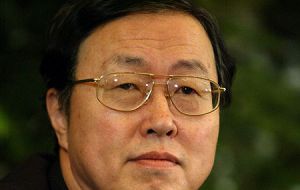MercoPress. South Atlantic News Agency
China promises a “stable currency policy” for 2007
 Bank of China Governor Zhou Xiaochuan
Bank of China Governor Zhou Xiaochuan China's central bank under international pressure to make the yuan more flexible will in 2007 pursue a “stable currency policy” to promote economic growth.
The People's Bank of China "will continue to strengthen and adjust financial control mechanisms, execute a stable currency policy, improve foreign exchange management and push for financial reforms and innovation'' Governor Zhou Xiaochuan said in his New Year speech. "We want to contribute to ensure stable and accelerated economic development in the country''. Zhou has said he wants to increase the flexibility of the yuan at a "gradual'' pace. However China's trade partners who claim Beijing unfairly keeps its currency undervalued to stoke exports, are keen for Zhou to move faster. China's widening trade gap has ballooned the nation's foreign-exchange reserves to one trillion US dollars and undermined government efforts to cool the economy. Beijing has admitted that its trade surplus may swell by almost two-thirds to an all-time annual high of 168 billion US dollars in 2006. China's central bank on December 29 relaxed currency controls to make it easier for individuals to buy stocks and bonds abroad and help reduce the value of the yuan. By making it easier to invest abroad, the central bank may reduce demand for the yuan. The People's Bank of China wants to slow the yuan's appreciation to prevent local exporters from losing their price advantage. "The central bank over the past year has kept a stable currency policy to keep the currency and loans growing at a reasonable rate, aiding stable and accelerated economic growth,'' Zhou said in his New Year's Day message according to the central bank's website. "The central bank also steadily improved financial reforms and accelerated the pace of reforms in shareholding of commercial banks.'' China's broad money supply grew at 16.8% in November amid the government's liquidity tightening, slowing from a 17.1% expansion in October. New yuan-denominated bank lending is expected to top 3 trillion yuan (384 billion US dollars) this year, overshooting the central bank's target of 2.5 trillion yuan, and vice governor Wu Xiaoling said recently that the key policy objective is to withdraw yuans from the market. Since ending the yuan's peg, the Chinese currency has floated "gradually" with reference to a basket of currencies including the euro, yen and South Korea's won. However it is not allowed to fluctuate more than 0.3% against the dollar from a rate set daily by the central bank. The Chinese currency this year rose 3.4% to 7.8051 against the dollar. It has risen 5.9% since the fixed exchange rate was scrapped.




Top Comments
Disclaimer & comment rulesCommenting for this story is now closed.
If you have a Facebook account, become a fan and comment on our Facebook Page!